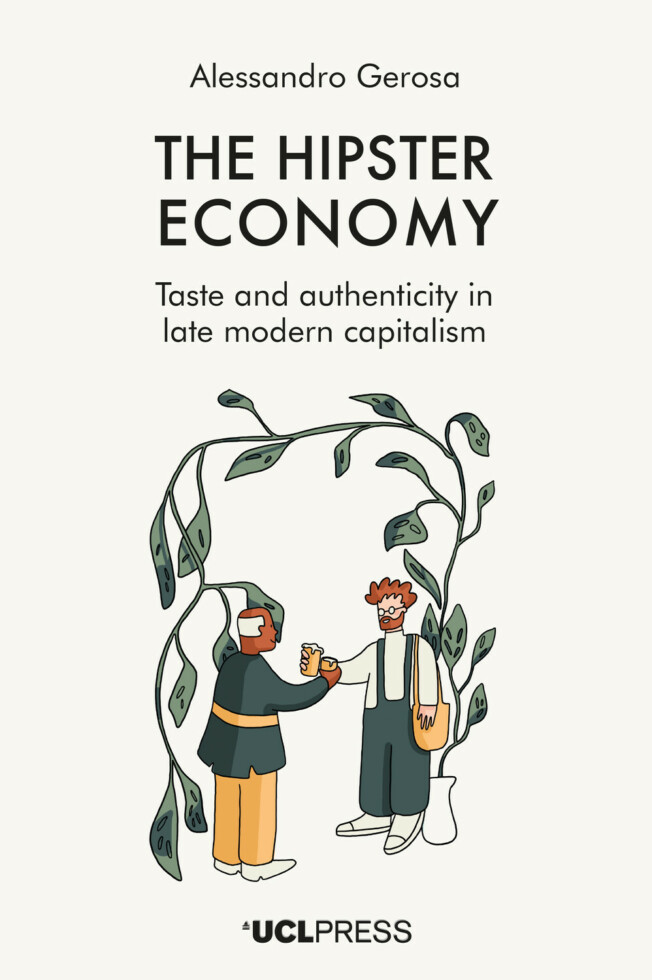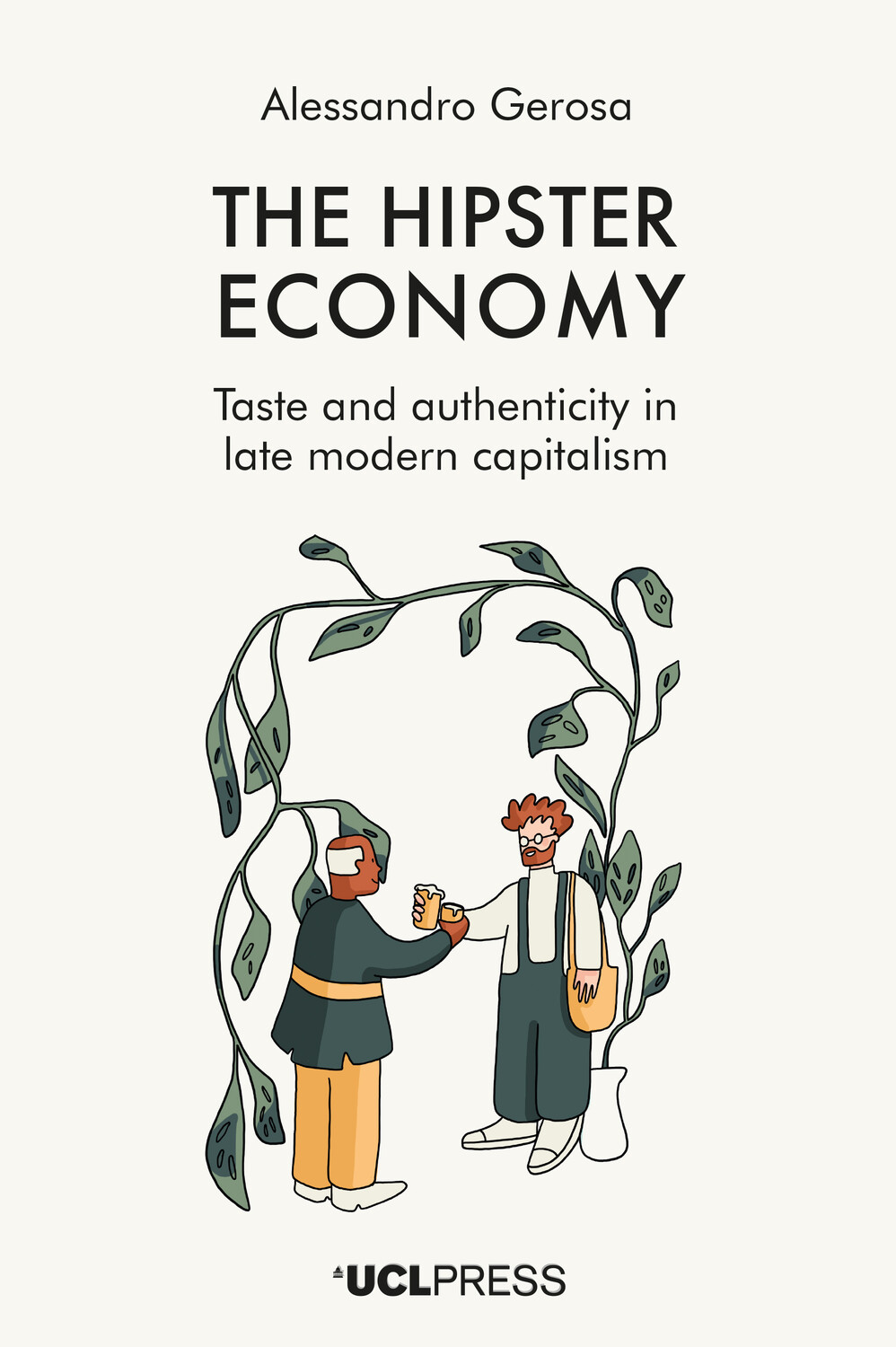
The Hipster Economy
Taste and authenticity in late modern capitalism
Alessandro Gerosa (Author)
Today, being authentic has become an aspiration and an imperative. The notion of authenticity shapes the consumption habits of individuals in the most diverse contexts such as food and drinks, clothing, music, tourism and the digital sphere, even leading to the resurgence of apparently obsolescent modes of production such as craft. It also significantly transforms urban areas, their local economies and development. The Hipster Economy analyses this complex set of related phenomena to argue that the quest for authenticity has been a driver of Western societies from the emersion of capitalism and industrial society to today.
From this premise, the book advances multiple original contributions. First, it explains why and how authenticity has become a fundamental value orienting consumers’ taste in late modern capitalism; second, it proposes a novel conceptualisation of the aesthetic regime of consumption; third, the book constitutes the first detailed analysis of the resurgence of the neo-craft industries, their entrepreneurs, and the economic imaginary of consumption underpinning them, and fourth, it analyses how the hipster economy is impacting the urban space, favouring new logic of urban development with contrasting outcomes.
Acknowledgements
Introduction: contextualising the hipster economy
1 A longue durée quest towards the meaning of authenticity
2 The hip aesthetic regime of consumption
3 The renaissance of neo-craft industries
4 The neo-craft micro-entrepreneurs
5 The hipster economy and the urban space
Concluding remarks: the past, present and future of the hipster economy
Notes
References
Index
DOI: 10.14324/111.9781800086067
Publication date: 23 January 2024
PDF ISBN: 9781800086067
EPUB ISBN: 9781800086098
Read Online ISBN: 9781800086067
Hardback ISBN: 9781800086081
Paperback ISBN: 9781800086074
Alessandro Gerosa (Author) 
Alessandro Gerosa is Lecturer in Marketing at the University of Birmingham.
‘The Hipster Economy succeeds as a thorough analysis of hipster culture as an aesthetic regime of consumption concerned with authenticity.’
www.hatemeditations.com
‘The Hipster Economy posits a consumer phenomenon in scholarly terms and The New Yorker confirms it in the marketplace.’
Journal of Consumer Culture
‘a bright insight into the state of late capitalism, analysing a new aesthetic consumer regime in the most diverse contexts such as food, drinks, clothing, music, tourism, craftwork and the digital and the urban sphere.’
Sociology
‘An important thesis… Recommended.’
CHOICE
‘The term “hipster” usually evokes frivolity, while the concept of “authenticity” has been studied so extensively it’s getting hard to find a novel use for it. In this lovely new book, Gerosa has given hipsterism the serious analysis it deserves. Through clear, unforced writing, he convincingly reveals the importance of a distinct form of hipster aesthetics, one based on authentic experience, for today’s consumption-based economy. Gerosa has successfully enlivened the conversations around authenticity and started new ones around late capitalism’s regimes of accumulation. This book is a fine achievement.’
Richard E. Ocejo, CUNY Graduate Center and John Jay College
‘The Hipster Economy is a very welcome addition to sociological discussions of authenticity and consumer culture. Ethnographic vignettes of “crafty capitalism” and passionate “taste dealers” enliven a theoretically rich argument that hipsterism should be treated not as a subculture, but as an aesthetic regime typifying contemporary life. Using the “hipster” as a lens, Gerosa provides a masterful tour of post-Fordist changes to modes of capitalism, patterns of urban development, and the material practices and subjective experiences of work, while charting the long-term development and contemporary expression of authenticity as a master narrative in consumer culture.’
Jennifer Smith Maguire, Sheffield Hallam University
Extra resources for The Hipster Economy
Read an interview with Alessandro Gerosa about The Hipster Economy in Valori
Listen to Alessandro Gerosa discuss The Hipster Economy on The Culture Journalist podcast.
Listen to Alessandro Gerosa discuss The Hipster Economy on the Intervistautori podcast (in Italian)
Listen to Alessandro Gerosa discuss The Hipster Economy on New Books Network: Sociology podcast.
Related titles
The Hipster Economy
Taste and authenticity in late modern capitalism
for more info
Today, being authentic has become an aspiration and an imperative. The notion of authenticity shapes the consumption habits of individuals in the most diverse contexts such as food and drinks, clothing, music, tourism and the digital sphere, even leading to the resurgence of apparently obsolescent modes of production such as craft. It also significantly transforms urban areas, their local economies and development. The Hipster Economy analyses this complex set of related phenomena to argue that the quest for authenticity has been a driver of Western societies from the emersion of capitalism and industrial society to today.
From this premise, the book advances multiple original contributions. First, it explains why and how authenticity has become a fundamental value orienting consumers’ taste in late modern capitalism; second, it proposes a novel conceptualisation of the aesthetic regime of consumption; third, the book constitutes the first detailed analysis of the resurgence of the neo-craft industries, their entrepreneurs, and the economic imaginary of consumption underpinning them, and fourth, it analyses how the hipster economy is impacting the urban space, favouring new logic of urban development with contrasting outcomes.
‘The Hipster Economy succeeds as a thorough analysis of hipster culture as an aesthetic regime of consumption concerned with authenticity.’
www.hatemeditations.com
‘The Hipster Economy posits a consumer phenomenon in scholarly terms and The New Yorker confirms it in the marketplace.’
Journal of Consumer Culture
‘a bright insight into the state of late capitalism, analysing a new aesthetic consumer regime in the most diverse contexts such as food, drinks, clothing, music, tourism, craftwork and the digital and the urban sphere.’
Sociology
‘An important thesis… Recommended.’
CHOICE
‘The term “hipster” usually evokes frivolity, while the concept of “authenticity” has been studied so extensively it’s getting hard to find a novel use for it. In this lovely new book, Gerosa has given hipsterism the serious analysis it deserves. Through clear, unforced writing, he convincingly reveals the importance of a distinct form of hipster aesthetics, one based on authentic experience, for today’s consumption-based economy. Gerosa has successfully enlivened the conversations around authenticity and started new ones around late capitalism’s regimes of accumulation. This book is a fine achievement.’
Richard E. Ocejo, CUNY Graduate Center and John Jay College
‘The Hipster Economy is a very welcome addition to sociological discussions of authenticity and consumer culture. Ethnographic vignettes of “crafty capitalism” and passionate “taste dealers” enliven a theoretically rich argument that hipsterism should be treated not as a subculture, but as an aesthetic regime typifying contemporary life. Using the “hipster” as a lens, Gerosa provides a masterful tour of post-Fordist changes to modes of capitalism, patterns of urban development, and the material practices and subjective experiences of work, while charting the long-term development and contemporary expression of authenticity as a master narrative in consumer culture.’
Jennifer Smith Maguire, Sheffield Hallam University
